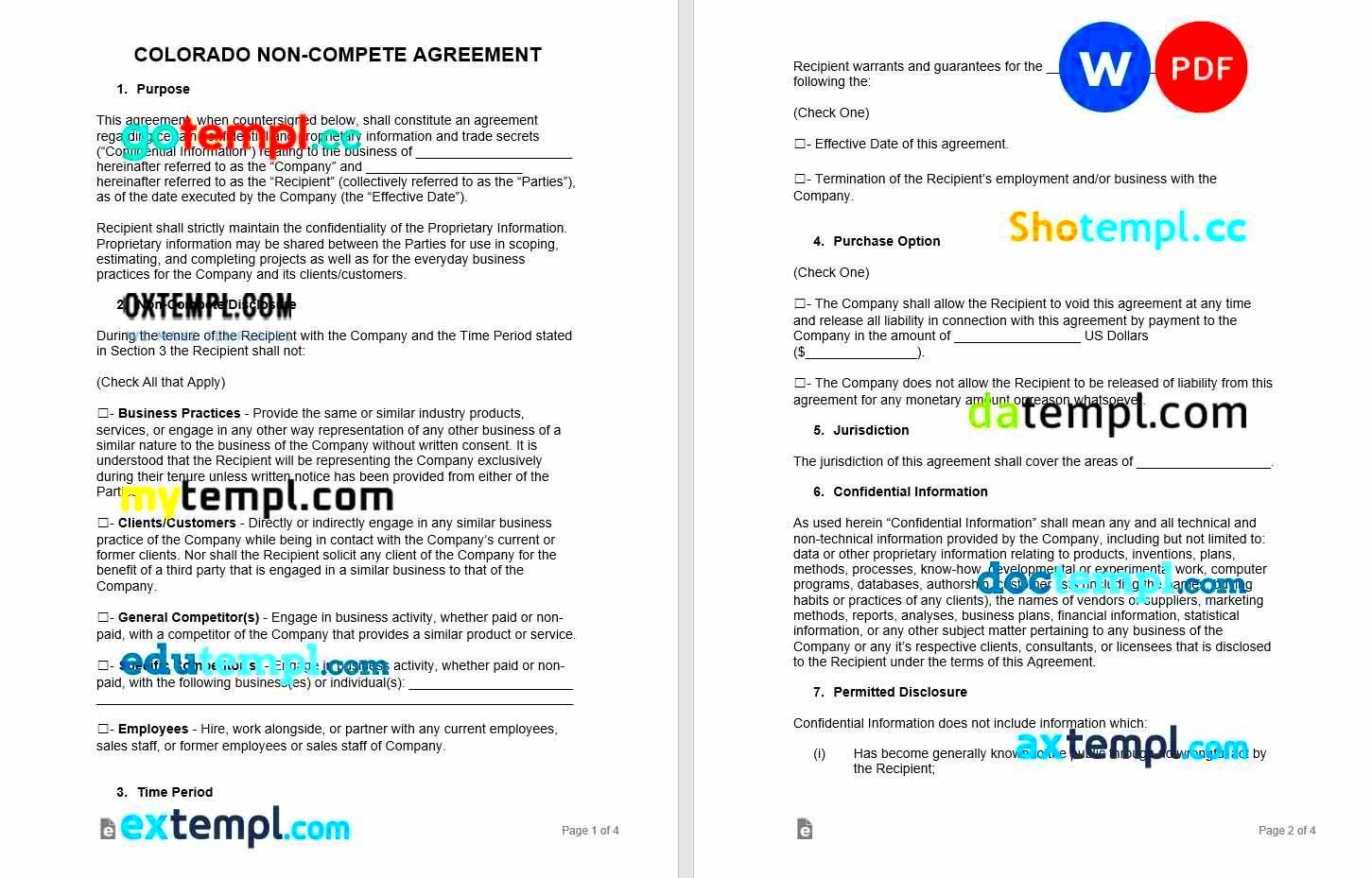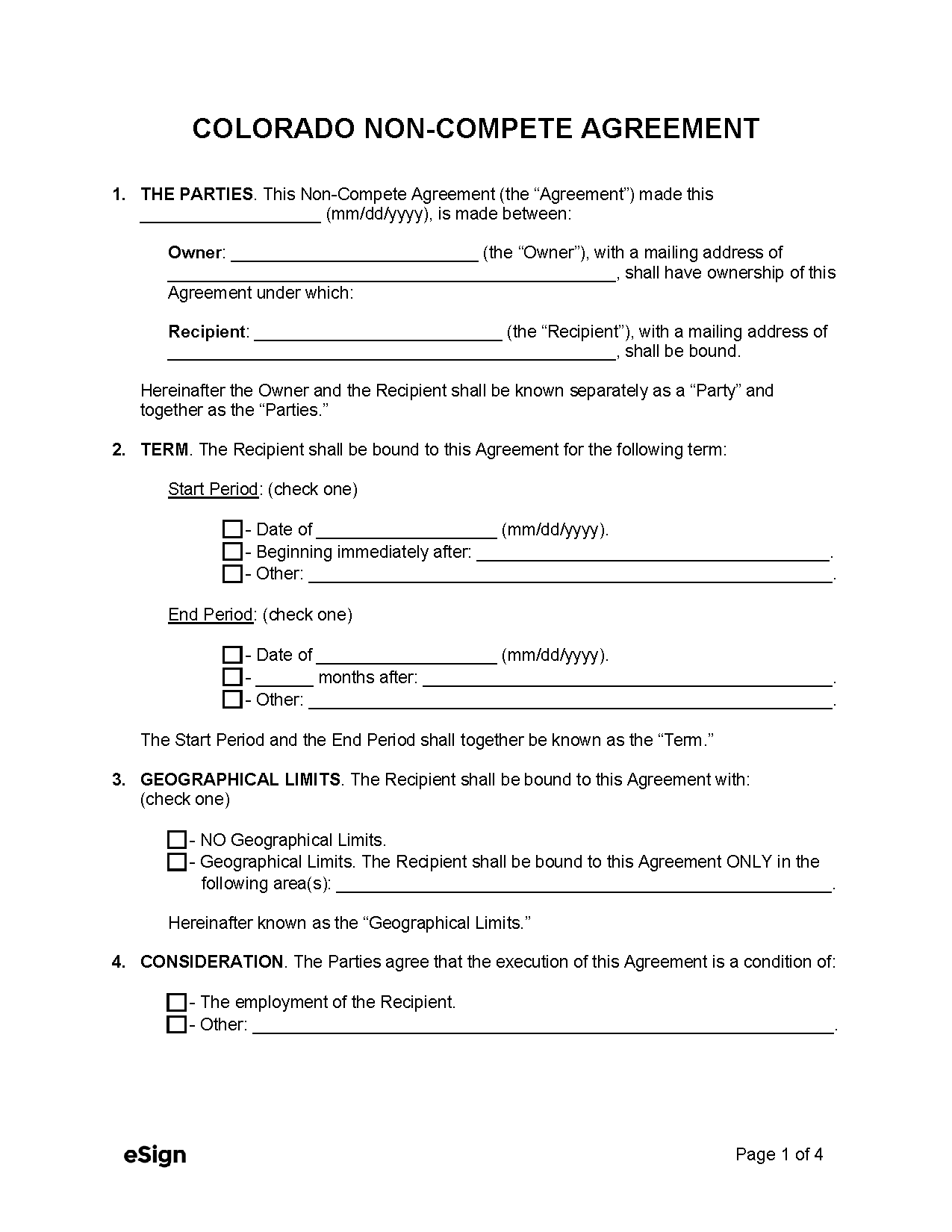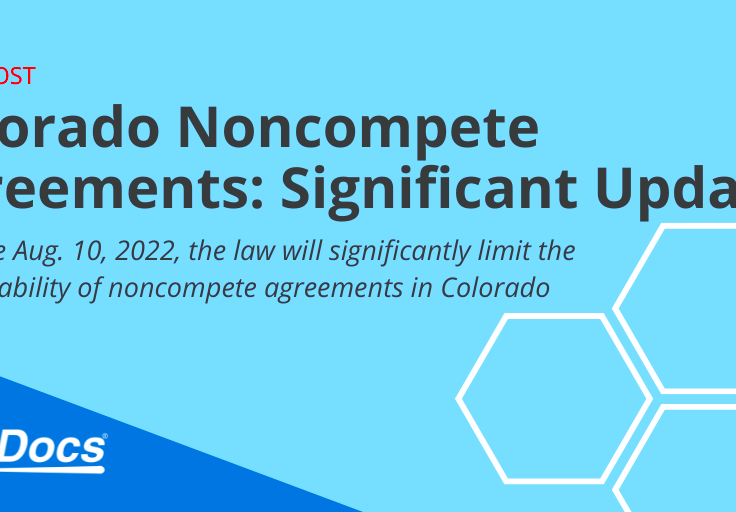Reforming Noncompete Agreements in Colorado
Noncompete agreements can be quite a challenge, especially when it comes to finding the right balance between safeguarding business interests and giving professionals the freedom to advance in their careers. I know friends who have had to make choices caught between an enticing job opportunity and a noncompete clause that felt like it would linger over them for a long time. These agreements are essentially contracts that prevent employees from working for a competitor or launching a similar venture for a period after leaving their job. Although they may appear straightforward at first glance they can have significant implications, for both employees and employers.
In Colorado noncompete agreements hold significance as the states job market undergoes a swift transformation. With sectors such as technology, healthcare and energy on the rise companies seek to protect their confidential information while employees aim for career opportunities. The question arises, about finding a balance and thats where Colorados distinct legal system comes into focus.
Why Noncompete Agreements Are Becoming a Concern

In recent years the increasing prevalence of noncompete agreements has caused quite a stir and understandably so. A friend of mine who works as a software engineer found himself trapped in a role that no longer suited him yet the noncompete clause prevented him from exploring other options. Instances like these have brought attention to the issue of noncompete agreements.
With the increasing competition among companies there has been a rise in the use of noncompete agreements to safeguard intellectual property and prevent employees from leaving. However this practice has also restricted career opportunities for workers, particularly in sectors where skills are highly sought after. Employees often perceive these agreements as constraints hindering their progress, in their careers. On the hand employers view them as an essential measure to safeguard sensitive information and ensure the sustainability of their businesses.
The issue comes up when these agreements are misused or applied too much. People are understandably worried about the extent of noncompete clauses now. Its not just high level executives or individuals with confidential information being asked to sign them but also entry level employees. This has sparked a discussion about whether these agreements are genuinely just a means to stifle fair competition in the job market.
Colorado’s Legal Changes to Noncompete Laws

Colorado has really been working on changing its noncompete laws and honestly, it’s long overdue. I recall a few years back having a conversation with a coworker who shared her feelings of being stuck because of a noncompete agreement she had signed without realizing it. Her story is not unique and there are many more like it out there which is why these legal reforms are so important.
In 2022 Colorado enacted a law that significantly altered the rules regarding noncompete agreements. The new legislation introduces restrictions on the usage of these agreements in terms of timing and application. For instance noncompete clauses can only be enforced for employees earning above a specific salary level and they need to be precisely designed to safeguard genuine business interests such as trade secrets or client connections.
This change is part of a larger movement where states are examining if noncompete clauses are causing more damage than benefit. For companies this means reconsidering their approach to creating these agreements. For workers its a significant relief as it provides them with greater flexibility to switch jobs without worrying about facing legal consequences.
Here are a few highlights regarding the recent legal amendments.
- Salary Threshold: Noncompete agreements can only apply to employees earning above a certain income level.
- Focused Purpose: Noncompete clauses must be tied directly to the protection of trade secrets or proprietary information.
- Enforcement: Noncompete agreements that don’t meet the new requirements are now considered void.
These changes show how Colorado is trying to find a middle ground between what businesses need and what employees are entitled to. They represent an important move towards promoting fairness in the work environment.
How the Reforms Affect Employers and Employees
The changes to Colorado’s noncompete laws have made a big difference for both employers and employees. I recall having a conversation with a business owner who was concerned about how these new rules would affect her ability to safeguard her clients. Conversely my friend at a startup felt a sense of relief as he no longer had to worry about facing legal action for switching jobs. This is the new reality now with different rules in place and both parties adapting to the changes.
For companies these changes mean that noncompete clauses aren’t a one size fits all solution anymore. They have to be more targeted and only apply to specific employees especially those dealing with information or earning above a certain salary level. The era of making everyone sign a noncompete is behind us. Businesses now need to explore ways to safeguard their interests such as using confidentiality agreements or nondisclosure provisions that can offer similar protection without the associated legal complexities.
On the hand workers have gained a sense of liberty. They now have the opportunity to pursue job prospects without the burden of an old contract holding them back. I know quite a few individuals who felt trapped in positions due to noncompete agreements but now they can finally break free. However this doesn’t imply that they can simply walk away with trade secrets — companies still retain the authority to safeguard their sensitive information.
To sum it up these changes have added fairness to the mix. Employers should reconsider their approach to safeguarding their interests while employees can now feel a sense of relief as their future becomes less constrained.
What Industries Are Most Impacted by the New Rules
While these legal changes are broad, they hit some industries harder than others. I remember a conversation with a software engineer, who felt the reforms would open doors for people in tech. And he’s right. In industries where intellectual property and client relationships are key, like technology, healthcare, and finance, these new rules make a huge difference.
In the technology sector, where innovations happen fast and employees are constantly moving between companies, noncompete agreements were often a tool to keep talent in-house. With the reforms, tech workers now have the flexibility to transition without legal battles, allowing them to contribute to new projects and startups more freely.
Healthcare is another sector deeply affected. Doctors, nurses, and specialists who used to be bound by noncompete clauses can now explore different job opportunities, especially in rural areas where medical professionals are in high demand. The reforms will likely result in a more flexible workforce, which could improve healthcare delivery across the state.
In finance, protecting client relationships is critical. Before the reforms, financial firms would often use noncompete agreements to prevent advisors from taking clients with them when they left. With the new rules, firms will need to focus more on providing value to retain clients rather than relying on legal barriers.
Overall, these industries, along with others like manufacturing and energy, are navigating a new landscape where innovation and mobility are more important than ever.
Steps for Employers to Adapt to the New Regulations
Businesses in Colorado are now grappling with the task of adjusting to the states updated noncompete rules. Change is always a challenge and I’ve spoken to entrepreneurs who are feeling somewhat uncertain about what to do next. However by adopting the mindset these changes can present an opportunity instead of an obstacle. Here are some ways employers can adapt.
- Review existing agreements: Start by reviewing all current noncompete agreements in your business. Identify which ones might no longer comply with the new laws. Any contracts that don’t meet the salary threshold or other specific requirements should be revised or voided.
- Focus on alternative protections: If noncompete clauses are no longer enforceable, employers should turn their attention to confidentiality agreements and nondisclosure agreements (NDAs). These can often provide the same level of protection without restricting employee mobility.
- Tailor agreements to key employees: The new regulations allow noncompete agreements for employees who handle sensitive information or earn above a certain salary. Ensure that any new agreements are narrowly tailored to only apply to these key roles.
- Train HR and legal teams: It’s crucial that your human resources and legal teams are up to speed with the new laws. They will be responsible for drafting compliant agreements and advising leadership on how to proceed.
- Communicate openly with employees: Many employees will be aware of these changes, and it’s important to foster trust by being transparent about how the company plans to protect its interests while respecting their rights.
Employers can ensure compliance and safeguard their businesses by adopting these measures instead of sticking to outdated approaches.
Challenges in Enforcing Noncompete Agreements Under the New Law
The recent changes to Colorado’s noncompete laws have made it trickier for companies to enforce these agreements. I recall a conversation with a buddy of mine who manages a tech startup and he expressed concerns about safeguarding his companys confidential data. Similar to numerous entrepreneurs he used noncompetes as a protective measure but the rules have now undergone a significant transformation.
One of the major obstacles is the new salary limit. Companies can no longer impose noncompete clauses unless their employees meet a specific salary threshold causing a lot of businesses to rush to adjust. If an employees income falls below the threshold enforcing a noncompete becomes impossible. This poses a challenge for smaller companies where essential staff members may not have salaries yet still possess valuable trade secrets or client connections.
Another challenge is the need for noncompete clauses to be specific. Agreements that are vague or too broad won’t be upheld anymore. Companies are now required to outline what they are safeguarding and make sure the limitations are reasonable. Employers are also under increased examination from the courts. This means that even small errors in drafting these agreements could result in them being dismissed entirely.
The changes in the law have made it harder to rely on noncompete agreements as a one size fits all approach and businesses are finding it challenging to adjust. Although this move is intended to protect workers it puts employers in a position where they must navigate between following the rules and protecting their own interests.
Protecting Your Business While Complying with Colorado’s New Laws
Despite the updates to noncompete regulations safeguarding your business remains feasible; you just need to be more strategic in your approach. Recently I had a conversation with a mentor who shared how his company had to change its strategy to protect its clients without depending on noncompete clauses. While it presents a challenge there are ways to adjust and ensure the security of your business.
First, focus on confidentiality agreements. While noncompete agreements might be harder to enforce, confidentiality agreements are still a powerful tool. These contracts can prevent employees from sharing proprietary information or trade secrets with competitors without restricting their ability to find new jobs.
Another approach involves nurturing your connections with your team members. When employees feel respected and perceive a transparent advancement trajectory they are less inclined to switch to a rival company reducing the need for noncompete agreements. Provide opportunities for development attractive perks and maintain channels of communication. Staff who feel valued often transform into devoted supporters of your brand.
Lastly, consider using a non-solicitation agreement. This type of agreement can prevent former employees from poaching your clients or staff, which is often a bigger concern than employees leaving for a competitor. Non-solicitation clauses are typically easier to enforce under Colorado’s new laws, as long as they are clearly written and reasonable in scope.
By implementing these tactics you can safeguard your venture and ensure compliance with legal regulations.
Frequently Asked Questions About Noncompete Reforms in Colorado
The changes to noncompete agreements have raised a lot of questions among people and I’ve been approached about it multiple times by coworkers and friends. Here are some of the frequently asked questions that I’ve come across.
Q: Can employers still use noncompete agreements in Colorado?
A: Yes, but they are much more restricted. Noncompete agreements are only enforceable for employees earning above a certain salary threshold, and they must be narrowly focused on protecting trade secrets or other legitimate business interests.
Q: What is the salary threshold for noncompete agreements?
A: The salary threshold is set by law and typically adjusts with inflation. Employers must ensure that employees meet this requirement for the noncompete to be valid.
Q: Are there alternatives to noncompete agreements?
A: Absolutely. Employers can use confidentiality agreements, non-solicitation agreements, and nondisclosure agreements (NDAs) to protect sensitive information and business interests without restricting employee mobility.
Q: What happens if a noncompete agreement doesn’t meet the new legal standards?
A: If a noncompete agreement doesn’t comply with the new regulations, it will likely be considered void and unenforceable. This means that employers can’t take legal action based on the agreement.
Q: How do these reforms benefit employees?
A: The reforms give employees more freedom to explore new job opportunities without being tied down by restrictive noncompete agreements. They ensure that only those in higher-paying, sensitive roles are subject to such restrictions.
These changes have had an impact on things and it’s crucial for both bosses and workers to grasp how they affect the dynamics of the workplace.
Conclusion: Moving Forward with the Changes
The changes to Colorado’s noncompete laws have altered the way businesses and employees function but this shift isn’t inherently negative. In fact it could mark the start of healthier and more equitable work relationships. I recall a discussion with a lawyer friend who was enthusiastic about how these new regulations would introduce fairness, into the job market. Employers will have to think outside the box and employees will have greater freedom to develop and pursue opportunities. Ultimately it’s about striking a balance and Colorado’s reforms are steering us, towards that goal.


